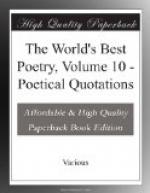... The best poetry is what we want; the best poetry will be found to have a power of forming, sustaining, and delighting us, as nothing else can. A clearer, deeper sense of the best in poetry, and of the strength and joy to be drawn from it, is the most precious benefit which we can gather from a poetical collection such as the present.”
Macaulay in his brilliant essay on Milton, which, published in the Edinburgh Review in 1825, gave him instant recognition as “a new literary power,” set up an interesting theory. A few extracts will give it:—
“Milton, it is said, inherited what his predecessors created; he lived in an enlightened age; he received a finished education; and we must therefore, if we would form a just estimate of his powers, make large deductions for these advantages.
“We venture to say, on the contrary, paradoxical as the remark may appear, that no poet has ever had to struggle with more unfavorable circumstances than Milton....
“We think that, as civilization advances, poetry almost necessarily declines. Therefore, though we admire those great works of imagination which have appeared in dark ages, we do not admire them the more because they have appeared in dark ages. On the contrary, we hold that the most wonderful and splendid proof of genius is a great poem produced in a civilized age....
“Of all people, children are the most imaginative. They abandon themselves without reserve to every illusion. Every image which is strongly presented to their mental eye produces on them the effect of reality.... In a rude state of society, men are children with a greater variety of ideas. It is therefore in such a state of society that we may expect to find the poetical temperament in its highest perfection. He who, in an enlightened and literary society, aspires to be a great poet, must first become a little child. He must take to pieces the whole web of his mind. He must unlearn much of that knowledge which has perhaps constituted hitherto his chief title to superiority. His very talents will be a hinderance to him. His difficulties will be proportioned to his proficiency in the pursuits which are fashionable among his contemporaries; and that proficiency will in general be proportioned to the vigor and activity of his mind....
“If these reasonings be just, no poet has ever triumphed over greater difficulties than Milton. He received a learned education. He was a profound and elegant classical scholar; he had studied all the mysteries of Rabbinical literature; he was intimately acquainted with every language of modern Europe from which either pleasure or information was then to be derived. He was perhaps the only great poet of later times who has been distinguished by the excellence of his Latin verse.”
And yet Macaulay goes on to say:
“The public has long been agreed as to the merit of the most remarkable passages, the incomparable harmony of the numbers, and the excellence of that style which no rival has been able to equal, and no parodist to degrade, which displays in their highest perfection the idiomatic powers of the English tongue, and to which every ancient and every modern language has contributed something of grace, of energy, or of music.”




